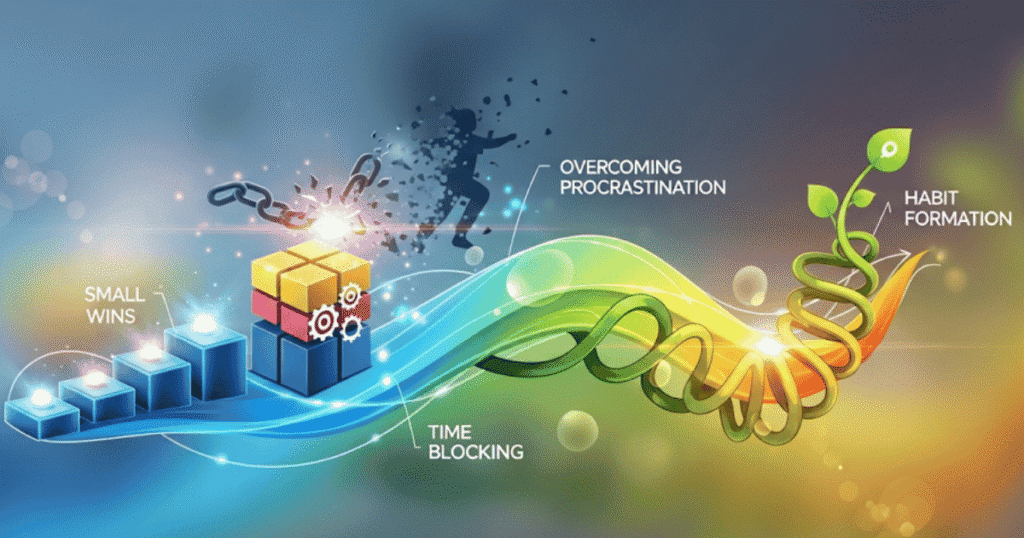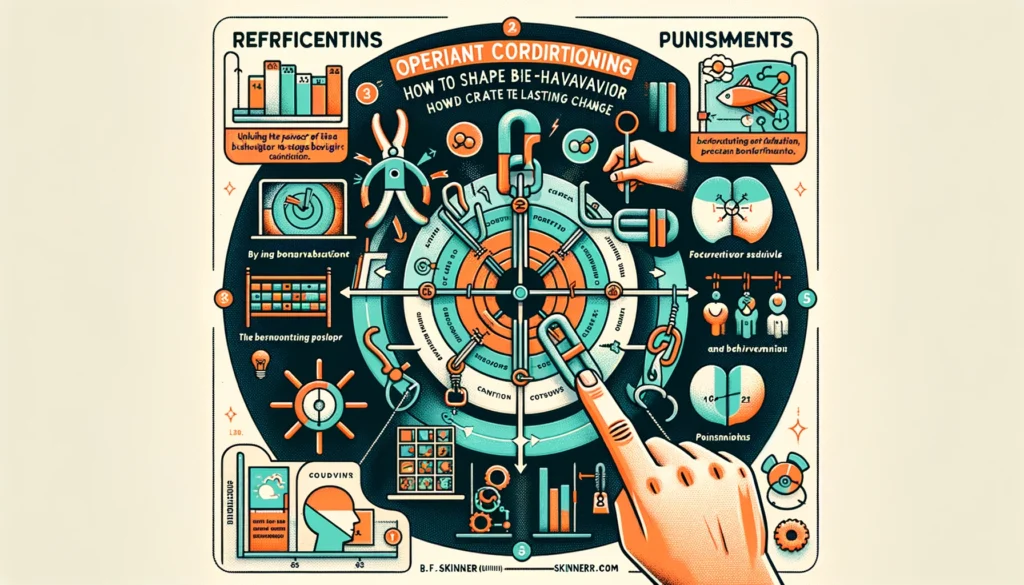
Why Psychology Helps Boost Productivity
Boosting productivity is not just about working longer hours. It’s about working smarter. Psychology gives us tools to understand how the mind works, and once you apply these insights, you can improve focus, reduce stress, and get more done in less time (Harvard Business Review, 2018).
If you’ve ever wondered how to boost productivity in the workplace or even in daily life, these five psychology tricks can help. They are practical, science-backed, and easy to try right away.
Read more: Mental Wellness Mindfulness Productivity Hacks
Key Takeaways
- Small wins trigger motivation and build momentum.
- Time blocking improves focus and prevents multitasking.
- Zeigarnik Effect makes it easier to return to unfinished tasks.
- 2-minute rule keeps procrastination from piling up.
- Environmental cues shape habits and reduce distractions.
Trick 1: The Power of Small Wins
The brain loves progress. When you finish even a small task, your brain releases dopamine, the “reward chemical.” This motivates you to keep going (Baumeister & Tierney, 2011).
How to Use It:
- Break big tasks into smaller steps.
- Celebrate small milestones, like sending an email or finishing a section of a report.
- Create a checklist to track progress.
👉 This method not only helps boost productivity but also keeps you motivated throughout the day.
Trick 2: Time Blocking with the “Focus Sprint” Method
One of the best psychology tricks to get what you want out of your day is time blocking. Instead of multitasking, you dedicate specific chunks of time to one activity.
Why It Works:
The human brain can only focus deeply for 60–90 minutes at a time. After that, energy drops. By working in “sprints,” you align with your natural focus cycle (Harvard Business Review, 2018).
How to Try It:
- Block 60 minutes for a task.
- Remove distractions (phone, notifications).
- Take a 5–10 minute break before starting the next block.
This simple change can dramatically improve how to boost productivity in the workplace or at home.
Trick 3: Use the Zeigarnik Effect to Stay on Track
The Zeigarnik Effect is a psychology principle that says people remember unfinished tasks better than completed ones (Zeigarnik, 1927). This explains why open projects keep nagging at your brain.
How to Apply It:
- Start a task, even if you don’t finish it. Your brain will remind you to return.
- Leave work at a “cliffhanger” point. For example, stop writing mid-paragraph. The urge to finish will make it easier to restart.
- Use this trick for studying, writing, or problem-solving.
This is a clever way to use psychology to boost productivity without forcing motivation.
Trick 4: The 2-Minute Rule
The 2-minute rule, made popular by productivity expert David Allen, uses psychology to reduce procrastination (Allen, 2015). The rule is simple: If a task takes less than two minutes, do it right away.
Why It Works:
- Small tasks pile up and create mental clutter.
- Quick wins build momentum and keep you from procrastinating.
Examples:
- Replying to a short email.
- Washing a dish after eating.
- Writing a quick reminder.
By clearing small tasks instantly, you free up mental energy for bigger projects.
Trick 5: Leverage Your Environment with Cues
Your environment influences behavior more than willpower. By setting up cues around you, you can shape habits that help boost productivity.
Practical Examples:
- Keep a water bottle on your desk → reminds you to stay hydrated.
- Place your to-do list where you can see it → keeps priorities visible.
- Use different spaces for different tasks (desk for work, couch for rest).
This trick is especially useful when thinking about how to boost productivity in the workplace. A clean, cue-based environment reduces distractions and builds focus (American Psychological Association, 2022).
Quick Comparison Table
| Psychology Trick | How It Works | Best For |
| Small Wins | Dopamine boost keeps motivation high | Long projects or tough tasks |
| Time Blocking | Matches brain’s natural focus cycle | Deep work and office tasks |
| Zeigarnik Effect | Unfinished tasks keep brain engaged | Writing, studying, problem work |
| 2-Minute Rule | Reduces procrastination | Daily small tasks |
| Environmental Cues | Shapes habits with reminders | Home and workplace setup |
FAQs
1. What are simple psychology tricks to boost productivity?
Simple tricks include breaking tasks into small wins, using time blocks, starting tasks without finishing, applying the 2-minute rule, and setting cues in your environment (Allen, 2015; Zeigarnik, 1927).
2. How to boost productivity in the workplace?
In the workplace, use time blocking, keep a visible task list, remove distractions, and celebrate small wins to keep team motivation high (APA, 2022).
3. Do psychology tricks really work?
Yes. They are backed by research in behavioral science and have been shown to improve focus, reduce stress, and increase productivity (Harvard Business Review, 2018).
4. What is the easiest trick to start with?
The 2-minute rule is the easiest. If something takes less than two minutes, do it now. It prevents procrastination.
5. How can students use these psychology tricks?
Students can use time blocking for study sessions, the Zeigarnik Effect to stay engaged with open notes, and small wins to track progress on long assignments.
Final Thoughts
Boosting productivity doesn’t always mean working harder. By applying these psychology tricks, you align your habits with how the brain naturally works. Whether you’re a student, professional, or entrepreneur, these small changes can make a huge difference in how much you achieve each day.
Read more: 15 Best Books for Self-Improvement That Will Change Your Life
Sources
- Allen, D. (2015). Getting Things Done: The Art of Stress-Free Productivity. Penguin Books.
- Harvard Business Review. (2018). The Science of Productivity. Harvard Business Review. Retrieved from https://hbr.org/2018/06/the-science-of-productivity
- Baumeister, R. F., & Tierney, J. (2011). Willpower: Rediscovering the Greatest Human Strength. Penguin Books.
- American Psychological Association. (2022). Boosting Workplace Productivity. APA.org. Retrieved from https://www.apa.org/topics/productivity
- Zeigarnik, B. (1927). Über das Behalten von erledigten und unerledigten Handlungen. Psychologische Forschung, 9(1), 1–85.
Mariam holds an MS in Sociology with a specialization in Medical Sociology and Social Psychology. With a strong academic background and extensive research work in both fields, she brings depth and clarity to complex topics. Her writing explores the intersection of society, health, and the human mind, making academic ideas easy to grasp and relevant to everyday life.


